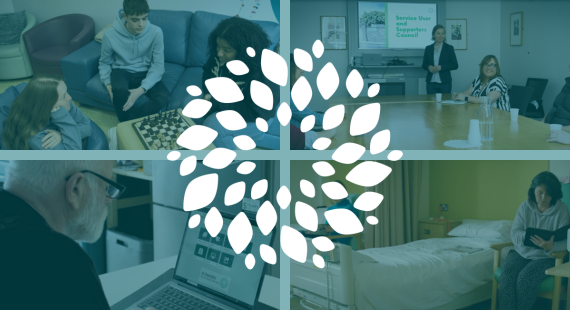
St Patrick’s Mental Health Services (SPMHS) is marking 100 cycles of a group therapy programme run by our Psychology Department.
We are celebrating the completion of 100 cycles of its Dialectical Behavioural Therapy (DBT) programme. This programme has been instrumental in helping hundreds of people manage intense emotions and improve their overall wellbeing.
Since its launch, the DBT programme, originally called the Living Through Distress programme, has seen 14,000 attendances across its 100 cycles. The programme aims to provide vital tools and teach skills for people engaging in self-harming or suicidal behaviours, and people who have difficulty managing and regulating emotions.
The aim of the programme is to help service users build meaningful lives by improving emotional regulation and helping them work towards personal life goals.
DBT teaches four key skills:
- Mindful awareness: Helps individuals control their attention and where their mind wanders
- Distress tolerance: Teaches ways to cope with strong emotions or difficult thoughts
- Emotion regulation: Helps people understand and manage their emotions, thoughts and urges to avoid harmful behaviours
- Effective interpersonal skills: Helps people strengthen relationships by clearly expressing their needs.
The DBT programme was created in response to the need for a structured approach to help people admitted to the hospital for self-harming behaviours. It has since evolved with input from leading DBT experts to provide care that meets the complex needs of people experiencing a wide array of emotional difficulties, including emotional and self-destructive behaviours.
The impact of DBT on the lives of service users
Dylan Moore, Principal Psychologist and Clinical Lead of the DBT programme here at SPMHS, spoke about the programme's profound impact: “DBT is a model of psychotherapy that teaches people coping skills that are often so central to helping to build fulfilling lives. Indeed, from the beginning, the focus of DBT has been to help service users find meaning in their lives by reducing life-threatening and quality of life interfering behaviours, while also increasing positive coping strategies.”
He continued, “Over the past 10 years, the Psychology Department at SPMHS has continued to develop the programme and has worked closely with leading DBT experts to improve our own expertise and expand the format of the interventions we deliver, with the aim of providing service users with the best possible standard of care. Through the DBT and Living Through Distress programmes, SPMHS has now run over 100 groups and supported hundreds of service users to develop DBT skills.”
Research conducted on the Living Through Distress programme revealed positive results about the efficacy of DBT-based programmes. Programme participants reported:
- Significant reductions in self-harming behaviours
- Improved distress tolerance
- Better skills in regulating emotions compared to people not receiving DBT treatment.
Additionally, participants reported heightened levels of mindfulness and reductions in anxiety, highlighting the programme’s effectiveness in improving both emotional wellbeing and overall mental health.
A former service user shared their personal experience: “Attending DBT was a transformative experience that reshaped my understanding of myself and my emotions. My experience of DBT was not just about individual growth, but about embracing the recovery journey as a whole, understanding that healing is not linear, and setbacks are part of that journey.”
The DBT programme at SPMHS has had a profound impact on the lives of many people, helping them to rebuild their sense of self-worth and regain control over their lives. As the programme marks its 100th cycle, we remain committed to providing high-quality, evidence-based mental healthcare to people who struggle with emotional regulation and impulsive behaviours.



